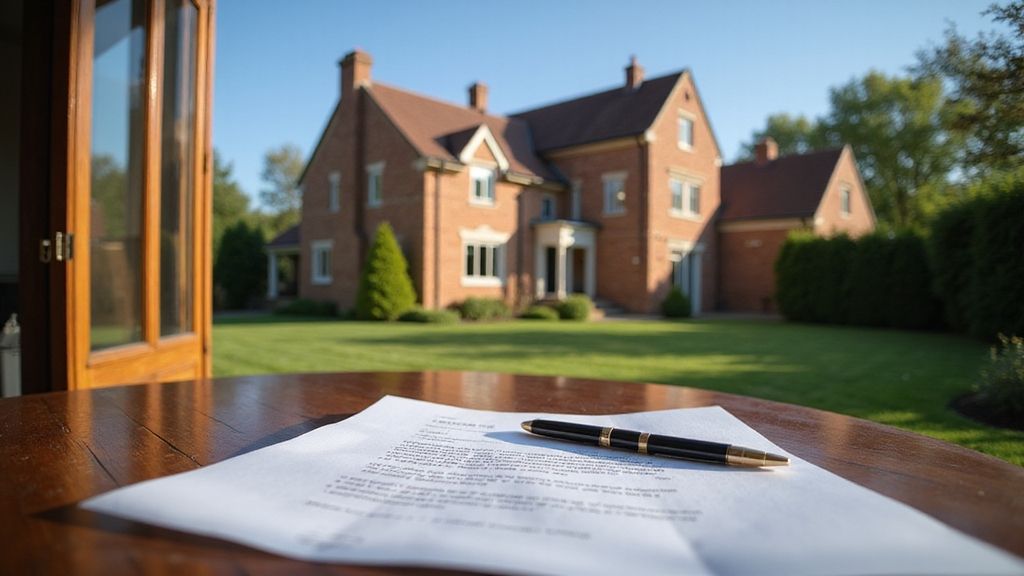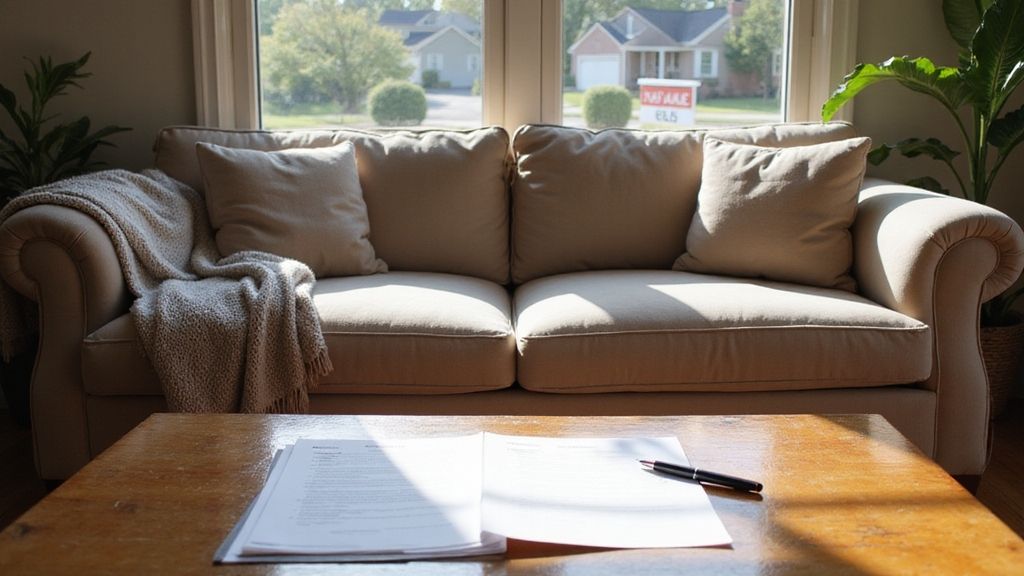Selling an Inherited House: The Ultimate Guide

Inheriting a house can be a double edged sword. You’ve got a valuable asset. But it comes with emotional and financial baggage. The property may be in disrepair or miles from your home. You may get unexpected taxes or maintenance costs. Dealing with co-inheritors can add to the complexity. Many people feel overwhelmed by the responsibility of managing an inherited property.
Selling an inherited house can be stressful. You’ll feel guilty about leaving a family home. Preparing the property for sale takes time. Navigating the legal requirements and tax implications is confusing. You’ll worry about getting a fair price in the current market. Sorting through personal belongings is draining. These can feel like insurmountable challenges.
Fortunately, there are solutions to simplify selling an inherited house. Professional real estate agents can assist you through the process. Estate attorneys can help with legal matters and tax considerations. Home stagers can prepare the property for a quick sale. Cash buyers offer a fast, hassle-free option for those seeking convenience. With the right approach, you can turn this inheritance into a financial opportunity.
This blog post will provide a comprehensive guide to selling an inherited house. You will learn practical steps to maneuver this complex process successfully.
Understanding the Inheritance Process
When a loved one passes away, their assets, including real estate, are typically distributed according to their will or, if there is no will, according to state laws. The process of distributing these assets is known as probate. During probate, the deceased’s will is validated, and an executor is appointed to manage the estate.
This can be a lengthy process, often taking several months to a year, depending on the complexity of the estate and any disputes that may arise among heirs.
As the new owner of the inherited property, you must familiarize yourself with the probate process and your responsibilities as an heir. Understanding the legal framework surrounding inheritance will help you navigate the sale of the property more effectively.
What Is an Inherited House?
An inherited house is a property received from someone’s estate after their death. As the new owner, you must decide whether to keep, live in, or sell it. When selling an inherited house, you should consider its market value and the tax implications involved. You may owe capital gains tax on any profits from the sale.

The process can be complex. You will need to clear personal belongings, address maintenance issues, and handle any potential disputes among heirs. It is important to understand state laws and requirements for selling inherited property.
You should also consider ongoing costs like taxes, insurance, and upkeep. Inherited properties may be subject to estate tax, which can affect the proceeds from the sale. Consulting real estate and tax experts can provide valuable guidance.
The Emotional Aspect of Selling an Inherited House
Selling an inherited house can evoke a wide range of emotions. The property may hold significant sentimental value, filled with memories of family gatherings and special moments. It is important to acknowledge these feelings and allow yourself time to grieve.
You might feel guilty about selling a property that was once a cherished home for your loved one. It is essential to remember that selling the house does not erase the memories associated with it. Instead, consider creating a memory book or taking photographs of the house to preserve those special moments.
Separating emotions from the practical aspects of selling can be challenging but is necessary for making informed decisions. Focus on the benefits of selling, such as financial security or fulfilling the deceased’s wishes.
Seek support from family, friends, or a grief counselor if needed. Enlisting help when clearing out the house can also ease the emotional burden. Keep meaningful items as mementos or share them with family members.
Legal Steps After Inheriting a Property
After inheriting property, you will need to follow several legal steps. The first crucial process is probate, which authenticates the will and appoints an executor.
As a beneficiary, you will need to obtain the death certificate and the will to prove your inheritance rights. If there is no will, state laws will determine how the property is distributed.
Next, assess the property’s value, as this will affect capital gains tax if you decide to sell. The valuation typically occurs on the date of the deceased’s death.
You should also address any outstanding debts or liens on the property before taking ownership or selling it. Consulting a tax professional can help you understand any potential implications and minimize your tax burden.
Work closely with the executor throughout the process to ensure a smooth transfer of the inherited house. Consider the stepped-up basis benefit, which may help reduce capital gains tax when you sell.
The stepped-up basis adjusts the property’s value to its fair market value at the time of the original owner’s death, which can significantly lower your tax liability.
How to Handle Multiple Heirs
Handling multiple heirs can complicate the inheritance process. It is crucial to understand everyone’s rights and responsibilities. Since state laws vary, consulting a local attorney can help you navigate the proper procedures.
If all heirs want to sell, agree on a price and strategy. Hiring an experienced real estate agent who specializes in inherited properties can provide valuable market analysis and help with buyer negotiations.
If not all heirs want to sell, consider options such as buying out others’ shares, selling your share, or partitioning through court action. Ensure that all parties sign the necessary documents before selling.
Be mindful of tax implications, particularly regarding the stepped-up basis for inherited homes. If an heir lives in the property, consider their rights and provide notice or negotiate move-out terms.
Communication is key. Hold regular meetings to discuss progress and make decisions. Keep detailed records of all agreements and maintain an open dialogue to address concerns and find mutually beneficial solutions.
Understanding Tax Implications of Inherited Properties
Inheriting property comes with important tax considerations. The IRS treats inherited properties differently from other real estate transactions. The step-up in basis is a significant tax benefit when inheriting property, adjusting its value to its fair market value at the time of death.
When selling an inherited property, you must report the sale to the IRS. The taxable amount will depend on the difference between the stepped-up basis and the sale price.
If you live in the inherited property for two years, you may qualify for a capital gains exclusion, which can be up to $250,000 for individuals or $500,000 for married couples.
Inheritance tax laws vary by state, so it is essential to research local regulations. Some states impose their own taxes, which can affect your overall tax burden. Federal estate taxes may apply to high-value estates.
Consulting a tax professional who specializes in inherited properties can provide personalized advice. Understanding these tax implications can help you maximize financial benefits when dealing with inherited property.
Common Challenges When Selling Inherited Houses
Selling an inherited house presents unique challenges. Emotional attachments often make it difficult to view the sale objectively. Family memories can complicate decision-making.
Managing multiple heirs can also be tricky, as conflicting opinions on pricing and timing may delay the process. The property’s condition might require extensive repairs or updates to attract buyers.
Additionally, any outstanding debts or liens on the property need to be settled before transferring clear title. Balancing a quick sale with getting the best price requires careful planning.
Understanding legal and tax implications is crucial. You must consider capital gains taxes, estate taxes, and state laws to avoid unexpected financial burdens or legal issues.
Should You Keep or Sell the Inherited Property?
Deciding whether to keep or sell inherited property involves three key factors: finances, emotions, and practicality.
Assess the property’s value, potential income, and maintenance costs.
If the property is mortgage-free, it could become a rental or vacation home. However, selling might be the better option if repairs are needed or a mortgage exists.
Emotional ties can also affect your choice. Consider the sentimental value and your relationships with other heirs. Remember, memories are not bound to physical places.
Your living situation and ability to manage the property are important. If you live far away or are short on time, selling might be the wisest choice.
Research the tax implications of keeping or selling the property. If you decide to sell, act quickly to reduce costs. Seek help from an agent experienced with inherited properties.
Traditional vs. Quick Sale: Which Option Is Better?
When selling an inherited property, you will need to choose between a traditional sale and a quick sale. Each option has its advantages and disadvantages based on your situation and goals.
Traditional sales involve real estate agents listing and marketing the property. This method often yields higher prices but takes longer to complete. You will also need to pay agent commissions and closing costs.
Quick sales, typically to cash buyers or investors, can close within 7-14 days. This option is ideal for those needing fast sales due to financial pressures or property issues. While offers may be lower, you will save on agent fees and avoid lengthy negotiations.
Consider your finances, the property’s condition, and your timeline when deciding. A traditional sale might work best for well-maintained houses without time constraints, while quick sales could benefit those facing foreclosure or dealing with properties requiring extensive repairs.
Preparing an Inherited House for Sale
Preparing an inherited house for sale requires careful planning. Start by thoroughly cleaning and decluttering the property. Remove personal items and outdated furniture that might detract from the home’s appeal.
Assess the property’s condition and prioritize necessary repairs. Focus on major issues that could deter buyers or impact value, such as updating electrical systems, fixing leaky roofs, or repairing structural damage.
Improve curb appeal by maintaining the lawn and power washing the exterior. This creates a positive first impression for potential buyers.
Hire a professional home inspector to identify hidden issues. Address problems proactively to avoid obstacles during the sale process. Gathering relevant documents, including the property deed and recent tax assessments, will streamline the selling process.
How to Price an Inherited Property
Pricing an inherited property requires balancing emotional ties with market realities. Research comparable homes in the area to establish a baseline value.

Hiring a professional appraiser can provide an unbiased assessment. Consider the property’s condition and factor in necessary repairs or updates. Unique features like historical significance or desirable amenities can increase value, while outdated systems or structural issues may decrease it.
Seek opinions from local real estate agents for insights into market trends. Be cautious of overpricing, which can lead to prolonged listing periods.
Remain flexible and willing to adjust your pricing strategy as needed. Regularly reassess to ensure alignment with market conditions and selling goals.
Consider the property’s location, size, and any special characteristics when determining price. Be prepared for negotiations and potential counteroffers from interested buyers.
Dealing with Emotional Attachments
Selling an inherited house often evokes complex emotions. Memories, nostalgia, and loss can make the process challenging.
Acknowledge your feelings and take time to grieve. Create a memory book or photograph the house to preserve special moments.
Separate emotions from the practical aspects of selling. Remember, the house is a physical asset. Focus on benefits like financial security or fulfilling the deceased’s wishes. Seek support from family, friends, or a grief counselor if needed.
Enlist help when clearing out the house. Keep meaningful items as mementos or share them with family. Consider joining a support group for those dealing with loss.
Recognize that selling doesn’t erase memories or diminish your love for the departed.
Ways to Avoid Common Inheritance Sale Pitfalls
To avoid common pitfalls when selling an inherited house, follow these five key steps:
- Accurate valuation: Hire a professional appraiser to determine the property’s market value.
- Legal clarity: Ensure clear title and obtain written agreements from all heirs.
- Property assessment: Conduct a home inspection to identify necessary repairs or updates.
- Tax considerations: Consult a tax professional about potential capital gains implications.
- Proper timing: Secure and maintain the property if you are not selling immediately.
Address legal matters promptly by consulting an estate attorney for complex issues. Consider selling as-is or investing in improvements based on the home inspection results.
Explore strategies with a tax expert to minimize your tax burden. Neglecting an inherited home can lead to depreciation and potential legal problems.
Sell Your Inherited House Fast with Pezon Properties
We at Pezon Properties offer a quick solution for selling inherited houses. We specialize in handling properties with complications like foreclosure or legal issues.
Our experienced team guides sellers through the complex process of inherited property sales, helping you avoid common mistakes and ensuring a smooth transaction.
We provide cash offers that can close deals in 7-14 days. This speed is crucial for properties facing foreclosure, minimizing losses and potential credit damage. Typically, we offer 70% to 90% of market value.
We manage all paperwork, including obtaining lender payoff statements for clear title transfer. Our streamlined process benefits those seeking a fast, hassle-free sale of inherited property. Homeowners can avoid foreclosure with us, as we buy houses as-is without any fees in Pennsylvania areas like Back Mountain, Abington, Allentown, and other popular areas of PA.
Conclusion
Selling an inherited house requires careful consideration of various factors. You should assess the property’s value and understand tax implications before making a decision. Legal, financial, and emotional aspects play crucial roles in this process.
Take your time to address challenges and explore all available options. Your choice should honor your loved one’s legacy while aligning with your goals. This guide equips you with the knowledge to navigate the complexities of inherited property.
Whether you choose to keep or sell, you are now prepared to make an informed decision that respects your loved one’s memory and meets your needs. If you are looking for a quick and hassle-free solution, remember that Pezon Properties is here to help you sell your inherited house with ease.
Give us a call anytime at 484-484-0971 or fill out this quick form to get started today!
Get A Fair Cash Offer On Your House

About the author
Mathew Pezon
Mathew Pezon is the founder and CEO of Pezon Properties, a cash home buying company located in Lehigh Valley, Pennsylvania. With several years of experience in the real estate industry, Mathew has become a specialist in helping homeowners sell their properties quickly and efficiently. He takes pride in providing a hassle-free, transparent, and fair home buying experience to his clients. Mathew is also an active member of his local community and is passionate about giving back. Through his company, he has contributed to various charities and causes.















